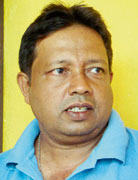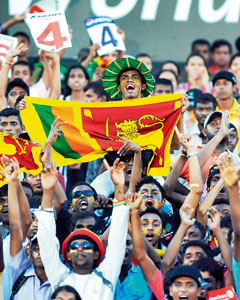Even the loudest vuvuzela has nothing on a papare band. Put a few fans and a papare band together in the bleachers and you have a formidable cheering section. Time and again, the raucous, infectious rhythms of papare have been the soundtrack to our victories and failures on the field.
Which is why, when the Police included the bands in a banned list along with sharp objects, banners and alcohol, local fans despaired of being able to live up to their unofficial motto “nava gilunath baan choon” (“even if the ship sinks, the party will go on”). Now that the ban is revoked, papare is back on everyone’s playlist and Sri Lanka is ready to show the world just how it’s done.
 |
| Clarence Perera: Playing papare since he was 15 years old |
M.A. Clarence Perera has been playing papare since he was 15 years old. Now 53, this government servant continues to play part time. “How can you ban the papare? If there is no papare, there is no cricket. The cricket we know comes with the papare,” he says. Sporting a Roy-Tho match t-shirt, Mr. Perera tells us that he played for the ’96 World Cup in which Sri Lanka was triumphant and that he’ll be there again to support the team this time. He’s just not entirely sure whom he’ll be playing with.
The system relies on an agent sending out a call for an event, to which a handful out of the hundred odd musicians scattered across the country will then respond. Though as few as three men can create the magic (one to play the bass drum, another the side drum and third the trumpet), bands can swell to up to 40 members, says Mr. Perera, adding that he plays both the bass drum and the side drum.
Many of the players tend to be in their mid-40s. Though few are professional musicians, they’ve all got music in their blood. “They grow up with the music and just play the beat,” he says, adding “they grow up with the papare music, like I did.” Over the years, the men have proved themselves irreplaceable. Experiments with CDs have established that there is nothing quite like having an actual band in the stadium. “Recorded papare music has no effect on the crowd. Playing live is what gets the crowd going. They need to see us play,” says Mr. Perera with obvious pleasure.
The instruments a band brings along include drums, cymbals, trumpets, trombones, the occasional saxophone and the molama, a set of cane beaters and drums that create that signature, feverish beat. The playlist tends to be an eclectic selection of Sinhala, Tamil and Hindi songs, with the rare addition of an English number, but don’t feel bad if you don’t recognize the tune. The traditional papare treatment transforms any song – “even if the song is slow, we can increase the beat and create a fast tempo,” says Mr. Perera.
Both fans and players appreciate their enthusiasm. Observing that it has been a part of cricketing culture for as long as he can remember it, sports commentator R.J. Shanaka Amarasinghe describes it as “quintessential to that atmosphere of Sri Lanka cricket.”
It’s indisputable that the effect of the distinctive pa-pa-ra sound of the trumpet on the fans is electrifying – “when you hear the papare music, you can’t sit still. It’s in our blood. Even when we are losing the game, a good number can get the people hyped up again,” says Mr. Perera.
For Sri Lankan players, one imagines the music is utterly familiar, just as it must be alien to the foreign teams - to whom it might even be a distraction. Still, you’ll find few fans who aren’t willing to make the most of the home advantage. Looking out over the field, Mr. Perera says he will sometimes spot players close to the boundary stepping to the beat or clapping their hands in time to the music. “They even dance when we win. Some of them smile and wave at us from the field. It’s encouragement for us to keep playing. And I think we do the same for them.”
 |
| Fans sans the papare at Sri Lanka’s first World Cup 2011 outing at Hambantota last Sunday. AFP |
Papare bands have an interesting history. Beginning in Negombo and the surrounding areas, they were associated with festivals held at the church. Band members who belonged to the parish would play for days, and bands were named after popular saints, reveals Mr. Perera. From there the music went out into devalayas, kovils and into carnivals and wedding celebrations.
(The kavadi music at Kataragama is played by papare musicians.) Soon enough, papare became the music that could be relied upon to draw crowds and those in need of such services hired papare bands to perform at everything from political rallies to corporate sales events. Papare made its first appearance in sports through the big matches played between local schools and on the hat collection rides school boys would make. Unsurprisingly, it soon became an accepted part of many local sporting events. Then it finally went international, riding on the tail of the touring cricket team, says Mr. Perera, revealing that he has visited places like Doha, Qatar, Dubai, and India with the team.
Despite the rising demand and all the perks, papare remains challenging for those who would make a career of it. Bands charge as little as Rs. 6500 per session, and though prices rise as the session lengthens (some may go on a whole day), it still has to be split between many musicians. With two children and a wife to support, Mr. Perera says times are hard. Then there’s the strain of playing itself. It can be incredibly tiring, he reveals speaking of gigs that run from 8 a.m. to 8 p.m with only the shortest of breaks in between. Sometime the police mistake them for troublemakers and chase them away. “When they interfere we are helpless,” he says.
However, once the music has begun and the fans are enthused, Mr. Perera and the other musicians always find the strength to keep on. “Sometimes when my arm hurts too much I feel like quitting, but then I see the people having such a good time and then I think I shouldn’t stop. This is what sets the mood. This is what gets them going.”
He’s keeping his fingers crossed for our team and says he’s looking forward to playing in this set of World Cup matches. For him this is a grand opportunity for the unique sounds of papare to be heard all over the world. “Cricket too is a part of being Sri Lankan and so is the papare,” he says simply. |



